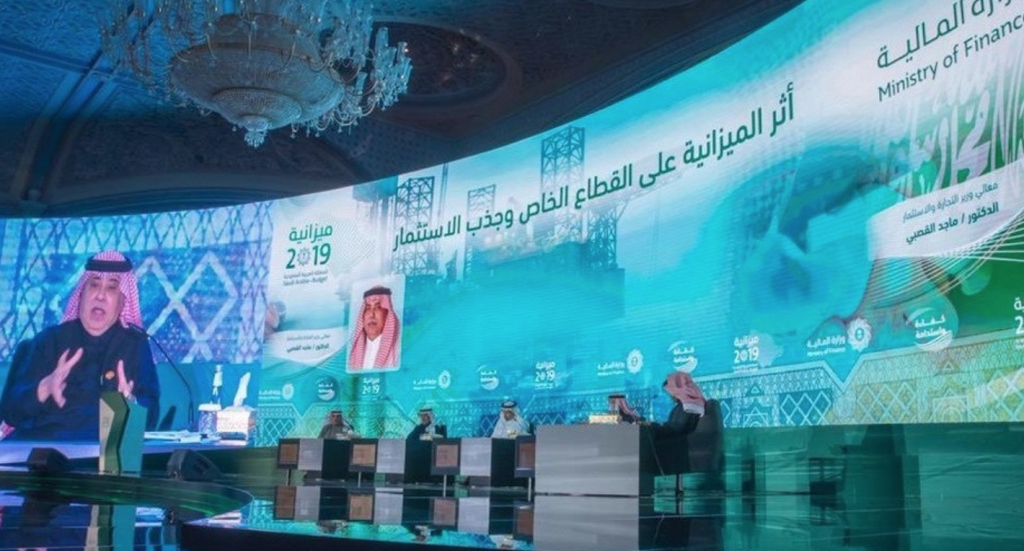
Remittances fell by SR9bn in 4 years reaching SR125bn from SR134bn: Khulaifi
Saudi ministers highlighted their ministries’ goals in post-budget sessions on Wednesday, a day after the government announced a SR1.106 trillion budget, the Kingdom’s biggest ever.
Economy Minister Mohammed Al-Tuwaijri said five sectors are prepared for privatization in the first quarter of 2019. They are water, energy, education, health and municipality sectors.
Al-Tuwaijri said Saudi Arabia expects its unemployment rate to decline starting in 2019 from the current level of 12.9 percent. He added that Saudi nationals participation in the labor market currently is 42 percent.
Foreign investment in Saudi Arabia more than doubled in 2018 to SR13 billion he said.
He said that in accordance with Vision 2030, the ministry is working to increase the government’s efficiency to attract more investments and support the private sector.
The minister also said that the participation of the private sector was effective, and the main objective of growth is to be reflected in terms of citizens’ incomes and lives.
Al-Tuwaijri said the number of licenses granted to foreigners doubled to 705 in 2018.
He expressed hope for the growth rate to reach 2.6 percent in 2019, based on plans developed according to the ongoing governmental support through major projects with the Saudi budget: Prudent, positive, futuristic continuation of stimulating the private sector to participate in national economic growth.
Finance Minister Mohammed Al-Jadaan said there is no intention of changing policy on expat fees.
Fuel prices are reviewed regularly, but there is no intention to increase other energy prices in 2019, Jadaan added.
He said the goals of the next budget are growth, supporting the private sector, providing services to the private sector and transparency.
“The level and rate of debt is currently acceptable as prices fluctuate according to different givens,” he added.
Addressing the forum, Dr. Ahmed Al-Khulaifi, governor of the Saudi Arabian Monetary Authority (SAMA), said the central bank is continuously monitoring the remittances and there has been a fall of SR9 billion in remittances over the last four years reaching SR125 billion from SR 134 billion.
“The Kingdom’s monetary reserves witnessed an increase of about SR40 billion during the last 10 months and it crossed $500 billion at present. There is no trend to change the exchange rate policy,” he said while expecting the stability of riyal.
Minister of the National Guard Prince Khalid Bin Abdulaziz Bin Ayyaf said the budget shows the strength and power of the Kingdom’s successful economy, thanks to the government’s meticulously planned economic strategy and development programs. The budget embodies the keenness of the wise leadership to achieve the well-being of the Saudi citizens, and it is a catalyst for the present and future, he observed.
Minister of Health Dr. Tawfiq Al-Rabiah said the budget includes many projects that will contribute to a remarkable growth and improvement in the health facilities and services across the Kingdom.
He said that there are 19 mega health projects including hospitals and medical towers that are ready for operation and they will be inaugurated during 2018 and 2019 in a number of regions and provinces of the Kingdom.
Minister of Housing Majed Al-Hoqail said this year the ministry started building 42 new housing projects in various regions of the Kingdom.
Minister of Education Ahmed Al-Issa said, “We have a project to create 600 educational buildings to dispose of rented premises.”
Minister of Labor Ahmed Al-Rajhi said, “We seek to make the recruitment of domestic workers from neighboring countries. The ministry launched 12 new business activities during 2018.”
Minister of Commerce Majed Al-Qasabi said the period for setting up of companies has been reduced from 15 days to 30 minutes in 2018. “Combating commercial fraud is a red line, and we will intensify combating money laundering and cover up business to achieve fair market competitiveness.”
Energy Minister Khalid Al-Falih highlighted energy sufficiency initiative with 70 percent Saudization. “We are developing a system to reduce the delay in issuing mining licenses,” he said.



























